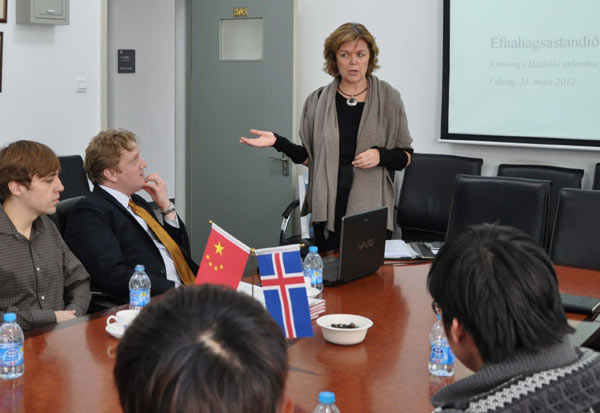Language students build bridges between two continents
Updated: 2012-04-21 09:50
By Luo Wangshu (China Daily)
|
|||||||||||
 |
|
Icelandic Ambassador to China Kristin Arnadottir speaks to students of the School of European Languages and Cultures at Beijing Foreign Studies University in March. [Provided to China Daily] |
Liu Wei, a senior student at Beijing Foreign Studies University, is excited about the prospect of employment by the Ministry of Foreign Affairs.
"I don't know which department I will work for," he said. "But considering previous graduates' experiences, I have a good chance of working at the Chinese embassy in Iceland. It's really helping me that I studied the language."
Liu, who hails from Hunan province, is among the first 16 undergraduates to study Icelandic at Beijing Foreign Studies University. He is scheduled to graduate this summer.
Not all of his schoolmates are as lucky as he.
"Although the other students are studying very hard and have job offers, few of them have found jobs that are related to the Icelandic language," Zhao Gang, president of the university's School of European Languages and Cultures, said on Thursday.
"Their job opportunities have been tightly constrained along with Iceland's economy."
He said the 16 undergraduates studying Icelandic enrolled at the university in 2008 are the only students there who are now majoring in the language.
Beijing Foreign Studies University was approved by the Ministry of Education in 2005 to start its Icelandic program three years later. It is still the only university in China that has such a program.
Zhang Yuchong, 23, who is also studying Icelandic, said he is worried about his career prospects after graduation.
"But I don't regret studying Icelandic as my major," he said. "It has opened a door for me to a unique culture, and I love it."
Being in the Icelandic program enabled him and his classmates to study at the University of Iceland at Reykjavik, capital of Iceland, for eight months. While there, each student received a scholarship amounting to roughly 600 euro ($790) a month."Students majoring in English, French and other commonly spoken languages rarely have these kinds of opportunities," he said.
The Icelandic program now employs two faculty members, one of whom is from China and the other from Iceland.
"Iceland lies at a distance from the European continent," Zhao Gang said.
"Icelandic has maintained the raw features of ancient northern European languages and offers a great means of researching northern European languages."
Zhao said the school has a collection containing more than 4,000 books in Icelandic. They were gifts from the Icelandic government and the Dutch researcher Paula Vermeyden. "It is the biggest Icelandic language library in China for sure, and it may be the biggest one in Asia," Zhao said, adding that faculty and students at the university are free to use the books.
"Icelandic is an amazing language, best-known through The Sagas of Icelanders, which are prose histories that are similar to the Homeric epics," said Wang Shuhui, a faculty member in the Icelandic program.
"My students told me that they wanted to do mathematics when they were reading Icelandic and that they were attracted by its precision," Wang said.
Wang, who majored in English as an undergraduate, was selected by the university to study Icelandic for three years in Iceland after graduation and then returned to teach the language.
"I'm grateful for the opportunity to learn and teach Icelandic here," Wang said. "Learning never stops, and I am learning with my students."
luowangshu@chinadaily.com.cn
Today's Top News
President Xi confident in recovery from quake
H7N9 update: 104 cases, 21 deaths
Telecom workers restore links
Coal mine blast kills 18 in Jilin
Intl scholarship puts China on the map
More bird flu patients discharged
Gold loses sheen, but still a safe bet
US 'turns blind eye to human rights'
Hot Topics
Lunar probe , China growth forecasts, Emission rules get tougher, China seen through 'colored lens', International board,
Editor's Picks

|

|

|

|

|

|





